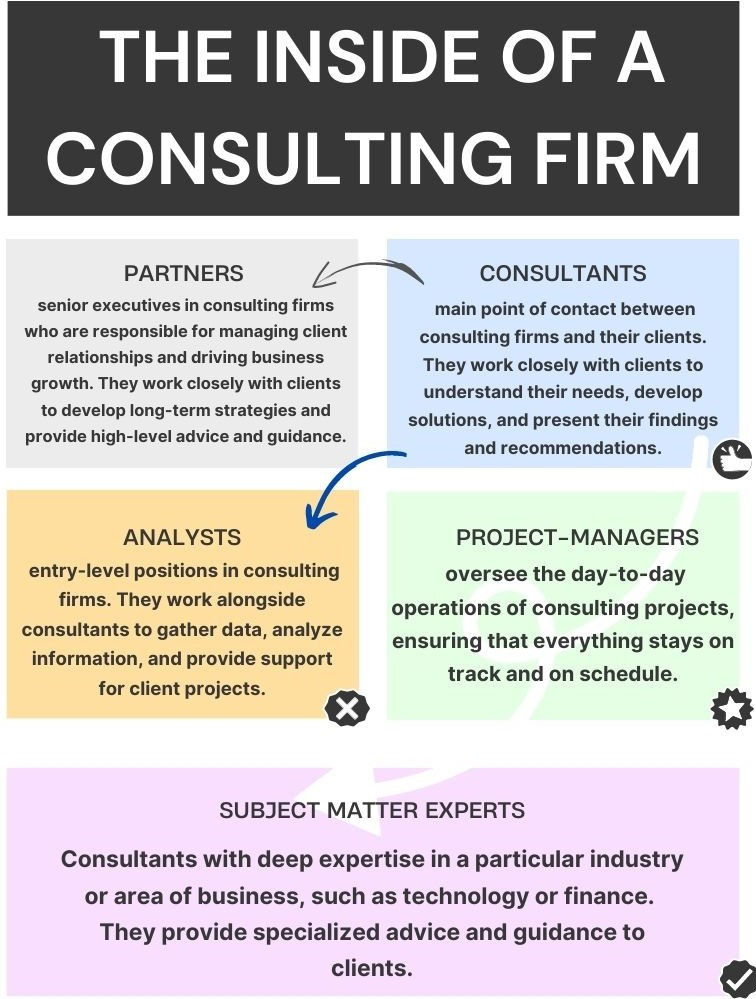Consulting Firms. What They Are. What makes them so precious.
Many people view consulting as a highly lucrative and prestigious field, but few truly understand what it entails. In this article, we explore the basics of consulting, including its definition.
Are you curious about what consulting firms really are? Well, let me break it down for you in super simple terms.
Basically, consulting firms are like super-smart advisors for businesses. You know how sometimes you need advice or help with something, like fixing a bike or figuring out how to study better? Well, businesses sometimes need help too, especially when it comes to making big decisions or solving problems.
That's where consulting firms come in! They're like the wise, experienced friends that businesses turn to when they need help. These firms have a team of super-smart people who have lots of knowledge and experience in all sorts of areas, like finance, marketing, and operations.
When a business has a problem or challenge, they're trying to solve, they'll reach out to a consulting firm for help. The consulting firm will then work closely with the business to understand what's going on and figure out the best way to solve the problem.
Consulting firms are really cool because they help businesses come up with new ideas and solutions that they might not have thought of on their own. Plus, they're always learning and growing, so they can stay up to date on the latest trends and technologies.
So, there you have it, friend! Consulting firms are like super-smart advisors for businesses that help them solve problems and make better decisions. Pretty neat, huh?
Scroll down below to read more…
This definition is absolutely correct, but a little incomplete.
The Many Faces Of The Advice Dice, Positions in The Consulting Industry
A consulting firm is not just full of consultants, in fact, consultants are not the only job profile in a consultancy, it’s a part of the many positions in a consulting firm.
Consulting firms are way more than just that, which you’re about to see.
Certainly, while the definitions I provided above give a general overview of some of the different types of consultants, they are by no means exhaustive. The consulting industry is quite diverse and covers a wide range of areas, so there are many other specializations beyond the ones I listed. Furthermore, there are various types of consultants as well, which we will discuss in the later sections.
If you're interested in learning more about the consulting industry and the different types of consultants out there, I'd encourage you to do some additional research. You could start by exploring the websites of consulting firms that specialize in areas that interest you, or by reading articles and books on the subject.
As you delve deeper into the world of consulting, you'll likely discover many fascinating areas of specialization, from sustainability and social impact consulting to supply chain management and beyond. For now, let’s discuss the different types of consultants.
Explore the Exciting: Types of Consultants in Today's Industry
Consulting is a thriving and diverse industry, with countless different types of consultants specializing in everything from management and technology to finance and marketing. Whether you're a business owner looking for expert guidance or a consultant seeking to specialize in a particular area, there are endless opportunities to explore in the world of consulting—
One of the most common types of consultants is the management consultant. These professionals provide advice and guidance on how to improve business operations, often focusing on areas such as strategy, organization, and process improvement. Management consultants work with clients across a wide range of industries, helping them to identify areas for improvement and develop strategies for success.
Another popular area of consulting is technology consulting. These consultants help businesses navigate the rapidly-evolving landscape of technology solutions and digital transformation. They may specialize in areas such as cybersecurity, data analytics, or software implementation, providing valuable expertise to help clients stay ahead of the curve.
Financial consulting is yet another area of specialization within the consulting industry. Financial consultants provide advice and guidance on matters such as investment strategy, risk management, and financial planning. They work with clients in a range of industries, from small startups to large corporations, to help them make informed financial decisions and achieve their goals.
Marketing consultants are another type of consultant, specializing in developing and implementing marketing strategies to help businesses attract and retain customers. They may focus on areas such as branding, advertising, or digital marketing, helping businesses to stay ahead of the competition and reach new audiences.
These are just a few examples of the many different types of consultants out there. Whether you're interested in sustainability, healthcare, or supply chain management, there are countless areas of specialization to explore within the consulting industry. So why not dive in and discover the exciting world of consulting today?
Pathway to Consulting: What to do? What to expect?
One popular route into consulting is through a top-tier MBA program. Many consulting firms actively recruit from MBA programs, and these programs provide students with the business knowledge and analytical skills needed to excel in the field. MBA programs also often offer opportunities to gain hands-on consulting experience through internships or consulting projects.
Another pathway into consulting is through experience in a particular industry. If you have deep expertise in a specific area, such as healthcare or technology, you may be able to leverage that experience to land a job in consulting. Firms often look for subject matter experts who can provide specialized advice and guidance to clients.
If you're just starting out in your career, you may want to consider getting a job at a consulting firm in an entry-level role. This can be a great way to gain exposure to the consulting industry and build your skills and experience. Many consulting firms offer structured training programs for new hires, which can help you develop the skills you need to succeed in the field.
Finally, networking can be a powerful tool for getting your foot in the door in the consulting industry. Attend industry events, reach out to alumni from your school who work in consulting, and connect with consultants on LinkedIn to learn more about the industry and potential job opportunities.
No matter which pathway you choose, a career in consulting can be rewarding and fulfilling. If you have a passion for problem-solving, a strong work ethic, and a willingness to learn, you may be well-suited to a career in this exciting field.
If you would like to look into what job positions look like at the higher side of the spectrum…
While consulting may seem like an easy and lucrative career path, it's important to recognize that it comes with its own set of challenges. As outlined in the above article, consulting requires a unique set of skills and a willingness to adapt to constantly changing environments. The article highlights the various types of consulting jobs available, ranging from management and technology to finance and marketing. It also provides an overview of the different types of consultants in the industry, including management consultants, technology consultants, and marketing consultants. Additionally, the article outlines several pathways for getting into consulting, including MBA programs, industry experience, entry-level roles, and networking. Despite the challenges, a career in consulting can be highly rewarding for those who are passionate about problem-solving and committed to making a difference for their clients.






